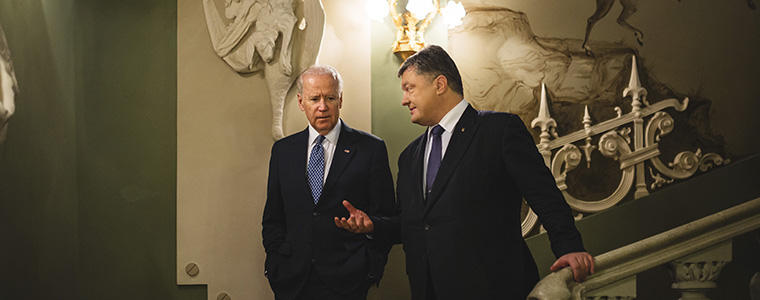As Biden Visits Kyiv, Priority is Reform for Transparency, USIP’s Taylor Says
As Vice President Joe Biden visits Ukraine this week, former U.S. ambassador to Ukraine Bill Taylor underscores that domestic corruption—in the economy and government—remains the key weakness in that country’s efforts to build long-term stability. Taylor, who is USIP’s executive vice president, returned recently from a trip to Ukraine.
On Dec. 10, USIP is co-hosting, with the U.S. Department of State, a discussion of the danger that corruption poses worldwide and possible ways to make progress against the scourge. The event, which is open to the public, features Ukraine as a case study, with a panel that includes Daria Kaleniuk, a co-founder and executive director of the Anticorruption Action Centre in Ukraine, and Ambassador William Brownfield, assistant secretary for the Bureau of International Narcotics and Law Enforcement Affairs at the State Department. In an interview at USIP, Taylor says:
- Ukraine’s civil society remains one of the country’s strengths. In the two years since the Euromaidan demonstrations that toppled President Viktor Yanukovych, that movement “has invigorated the politics [and] the demand for economic reform and political reform,” Taylor said.
- More reforms are needed. “What’s not working yet is the implementation of the depth of reform that is necessary. Corruption in government and the economy remains entrenched and is holding back economic growth.
- International sanctions on Russia are working. “Economic sanctions have turned out to be the most effective tool that the West … has against this invasion” of Ukraine by Russia, he said. They “are having a real effect on the Russian economy … that is responsible for the relative backing-off of the Russians in Donbas.” While Russian-backed separatists in the Donbas region are not fully respecting the ceasefire agreement, their attacks and the deaths of Ukrainian troops “are way down.” A continuation of those sanctions may force Russian President Vladimir Putin to remove Russian forces that are supporting those separatists in Donbas, he said. The sanctions should be sustained until Russia withdraws from Crimea, which it declared annexed last year, or otherwise resolves the Crimea issue to Ukraine’s satisfaction, Taylor said
- The United States and its partners have delivered too little support to Ukraine so far. Despite widespread support in the United States for Ukraine, “we have not provided the magnitude of economic support that the Ukrainians need,” Taylor said.
- Vice President Biden’s visit “is another demonstration” of U.S. political support for Ukraine. “Vice President Biden, to his credit, has really put his back into support for Ukraine,” Taylor said.
